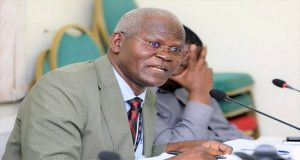
By Davis Mugabi
The National Forestry Authority has offered to provide one million (1,000,000) assorted tree seedlings for planting as part of the celebration of the Uganda Water and Environment Week 2022.
Yesterday, there was a formal launch of the 5th Uganda Water and Environment Week 2022. During the launch at the Ministry of Water and Environment headquarters in Luzira, the State Minister for Water Aisha Sekindi flagged off
a “450 kilometre Walk for Water, Environment and Climate Change” from Kampala Capital City to Lira City.
The Uganda Water and Environment Week (UWEWK) has become an annual flagship program of the Ministry of Water and Environment since This year, the 5th Uganda Water and Environment Week will be held from Sunday 20th March to Friday 25th March 2022, under the theme “Water and environment for peace and socio-economic transformation of Uganda”.
As part of these activities, there will be tree planting exercises.
Against the above background, NFA has donated one million seedlings for planting during this period.
Sekindi asked participants to “seize this opportunity with both hands, plant and grow as many trees as we can.”
“We welcome other organizations that can contribute more seedlings for planting during this March – May rainy season,” Sekindi said.
Water and Environment data shows that environmental degradation in Uganda has been increasing in an unprecedented rate. For instance, from 1900 to 2017, 2.4 million hectares of forest cover had been lost. Uganda’s wetlands are experiencing unsustainable degradation rate of 2% annually. From the ministry’s assessment, the total renewable surface water resources reduced by 34% between 1995 and 2011 and this is continuing. Pollution of water resources is as well on the increase due to high population growth, urbanization, industrialization, indiscriminate waste disposal, as well as degradation of water catchments.
According to Sekindi, the impact of climate change brings additional risks and challenges with severe negative impacts, in all angles; socially, economically and environmentally.
Since 2019, Uganda has been experiencing intensive rains resulting in floods with tremendous damages and losses, including loss of lives, settlements, threats to major water infrastructures, essential services and property. These events have resultant negative impacts to the socio-economic development efforts. Several government efforts have been made to prevent further degradation and restore degraded environment.
Sekindi says that there is need for a mind-set change in handling water and environment resources if we have to survive the negative impacts of our misuse and climate change.
“Let me sound a warning to all those in illegal protected zones of the lake, rivers, wetlands, mountain slopes and forest to vacate or else be evicted. During the walk, there will be several stopovers at designated points along the route to among others join communities and institutions in creating awareness, demonstrating best practices and action on the ground for clean and healthy water and environment,” Sekindi said.
As a Ministry there are several interventions, Sekindi pledged that: “we continue to undertake in form of government projects and programmes to ensure integrated management and development of the water and environment resources for generations.”
“Some of these interventions are implemented under decentralized and deconcentrated structures of the ministry in order to provide quality services to the people of Uganda. Awareness raising, training, research and dialogue is key in moving together,” Sekindi noted.






